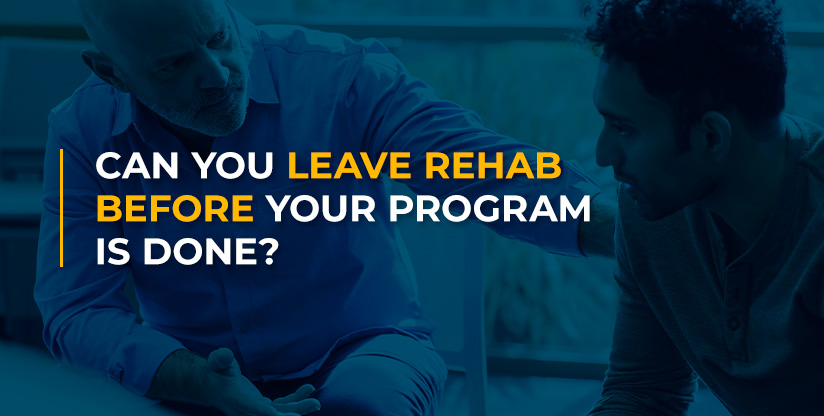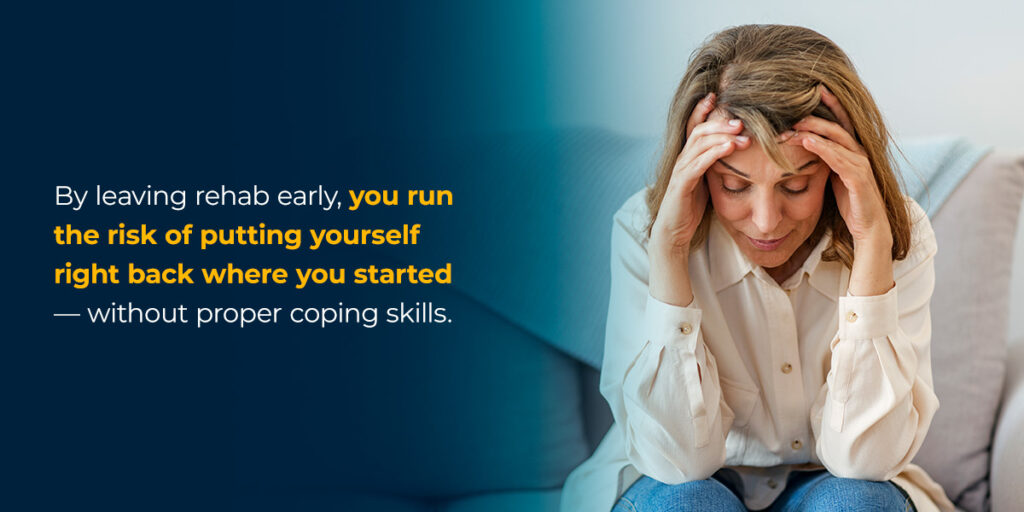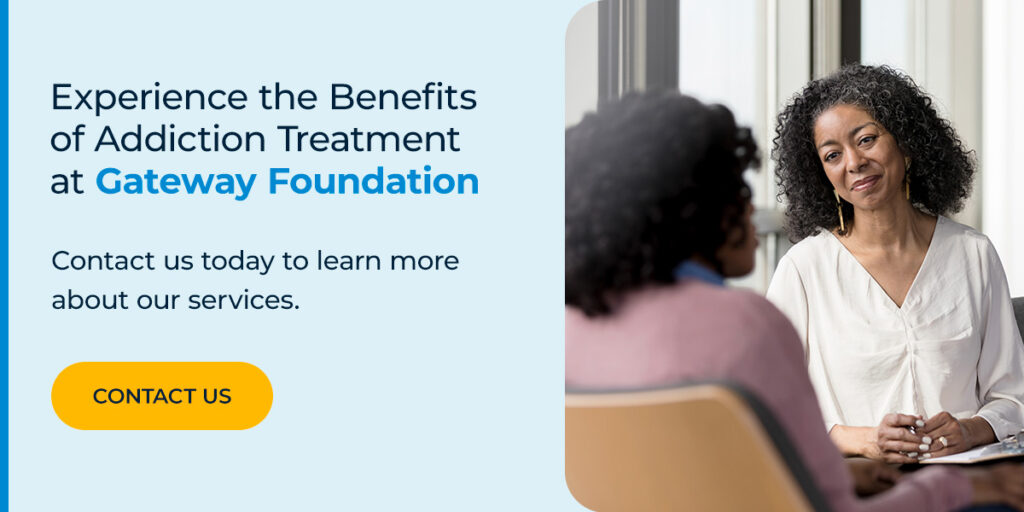- Jan 3
- Residential Treatment CenterTreatment

Just as it’s your choice to enter addiction treatment, you also have the decision to leave early. However, leaving before completing your 30-day program is often not advised. People progress through treatment at varying rates, but research has shown the longer you stay in treatment, the better outcomes for your long-term health and recovery. Every step of the treatment process keeps you safe, teaches you crucial life skills, and increases your chances for a lasting recovery.
Here are common reasons a person might leave rehab early and the impact it can have on recovery.
Can You Voluntarily Leave Rehab?
You can voluntarily leave inpatient treatment before hitting your 30-day mark. The medical team and the addiction specialists at your treatment center cannot hold anyone against their will. And while family and friends can try their best to encourage a loved one to stay, the decision is ultimately up to the person pursuing treatment. It’s important to keep in mind that most people leave in the middle of their care program due to anxiety and not because they’ve considered the full extent and implications of their decision.
If you’re currently in treatment and are considering leaving, discuss your feelings with your counselors and therapists. Addiction counselors have experienced this before and can offer advice to quell anxieties or make adjustments to your treatment plan if needed. It can also help to discuss concerns in group therapy, as others might feel the same, which can lead to you strengthening each other’s resolve.
Common Reasons for Wanting to Leave Early
Here are a few common reasons people want to leave treatment early:
Denial
Many people might enter treatment believing that they do not even have a problem with substances. They might also hold the belief that their drug addiction is not as serious as their peers and they, therefore, do not need treatment. However, it’s important to recognize that 30-day treatment is just the beginning of a lifelong recovery journey, and there will be ups and downs.
Ultimately, recovery will take time, effort, and perseverance — making it crucial to see treatment all the way through before you notice the beneficial impacts it will have on your life.
Complex Emotions
Addiction treatment and therapy can bring up all kinds of complicated emotions. When you start your program, you’ll quickly begin meeting with therapists and counselors. The aim of these sessions is to discover the underlying emotions and triggers that might have contributed to your substance use disorder.
While it’s crucial to have these discussions in order to make positive changes, addiction treatment can stir emotions like doubt, shame, or anxiety that can make it challenging to continue the program. It’s also common to feel overwhelmed by the changes necessary for recovery. Remember to take each day one step at a time, knowing that the more work you put into addressing these underlying issues, the more positive results you’ll see.
Detox and Withdrawal
The withdrawal experience is another reason people often want to leave early. Medical detox can produce physical and emotional withdrawal side effects. Depending on the substance you are withdrawing from, symptoms can include nausea, depression, sweating, irritability, anxiety, and mood swings.
It’s important to recognize that withdrawal can be tough, but the more intense symptoms will subside within a few days. Also, note that detoxing with the help of experienced medical staff is the safest way to manage symptoms and keep you safe.
How Leaving Rehab Early Impacts Recovery
Leaving your treatment program early can have many implications on your recovery, including:
Health Effects
The initial withdrawal process can be life-threatening. Without crucial medical advice and supervised help, you can experience strokes, heart attacks, and even seizures. Undergoing withdrawal and leaving early can also lead to relapse, and since your body has decreased its tolerance to substances, you can suffer a fatal overdose.
Recover is more than just breaking the cycle of drug addiction. Treatment plans will also include exercise and proper nutrition to help your body heal from the health effects of substance use. Overall, sticking with treatment can help you improve your overall health and wellness.
Lack of Necessary Skills

Addiction treatment offers the tools needed to treat your addiction and address emotional and psychological issues outside of rehabilitation. By leaving rehab early, you run the risk of putting yourself right back where you started — without proper coping skills. While you may feel ready to end treatment early, remember that recovery is often a lifelong process. Even after detox, your long-term success will depend on additional factors, including:
- Individual counseling
- Nutrition counseling
- Group therapy
- Nutrition counseling
- Building a support network
Adverse Impact on Relationships
Addiction often has an adverse effect on one’s closest relationships. Deciding to end treatment early can put a strain on the connections among friends and family who are supporting your recovery. The harm to these relationships and a lack of support can make relapse more likely. In treatment, you’ll learn crucial communication skills that can help you strengthen your relationships. You’ll also have the opportunity to form new and supportive friendships among peers, and these connections can last a lifetime.
How to Encourage a Loved One to Stay in Treatment
If you have a loved one thinking about ending treatment early, try these tips:
- Offer comfort and support: Provide reassurance rather than judgment. Tell your loved one that you are always there for them during and after they finish treatment, and praise them for their courage in sticking with it.
- Set realistic goals: Encourage your loved one to take it day by day and set realistic goals to help them complete their stay.
- Remain optimistic: Remind your loved one they have the strength to finish treatment and remain hopeful that they will see it through. Help them focus on the benefits of completing treatment and achieving a healthier, substance-free lifestyle.
- Encourage open communication: Express your interest in what they are learning by listening and asking questions about their recovery journey.
When talking to your loved one, remember to remain kind but firm. A person in addiction treatment with genuine social support is less likely to leave early and experience a relapse.
Experience the Benefits of Addiction Treatment at Gateway Foundation
If you’re considering leaving your 30-day treatment program early, try waiting a day to see how you feel. You never want to make any big decisions on your worst day. It’s crucial to take recovery day by day, remain hopeful and positive about your progress, and be committed to staying another day. Before you know it, you’ll be on the road to recovery.
At Gateway Foundation, we provide compassionate, evidence-based addiction treatment to help you end your relationship with substances and begin the path to successful recovery. We offer services like medical detox, behavioral therapies, support groups, and individual therapy to help you heal and achieve a healthier lifestyle.
Experience the benefits of sticking to a comprehensive, compassionate treatment program. Contact us today to learn more about our services.



